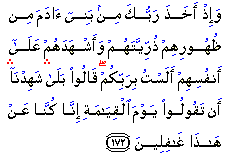Pre-Earthly Existence, Excellence in all things, Tawhid
Issue 558 » December 4, 2009 - Dhul-Hijja 17, 1430
Living The Quran
Pre-Earthly Existence
Al-Araf (The Heights) Sura 7: Verse 172
 "Now, behold! Your Lord took from the Children of Adam - from their loins - all the souls that would become their posterity. And He made them bear witness to their own souls - saying to them: Am I not your Lord? They said: Oh yes, indeed! We do so bear witness! This we did in the event that you should say on the Day of Resurrection: Indeed, we were heedless of this truth."
"Now, behold! Your Lord took from the Children of Adam - from their loins - all the souls that would become their posterity. And He made them bear witness to their own souls - saying to them: Am I not your Lord? They said: Oh yes, indeed! We do so bear witness! This we did in the event that you should say on the Day of Resurrection: Indeed, we were heedless of this truth."
The general meaning of this verse is that God assembled the Children of Adam, all of humanity, in spirit before they came into material existence and took physical shape. God declared His unrivalled Lordship and all people assented in a solemn covenant.
One may ask, how did this take place? And why can I not remember it? Of course, human beings, by nature, remember nothing of very vital periods in their lives - such as conception and birth, early childhood, and so forth. Yet, they know it to have taken place by the account of their parents, for example, and their own later experience. Similarly, the Covenant of Pre-Earthly Human Existence has been reported in God's revealed Books and by His Prophets and has been imprinted on our souls, so that there is an innate or dormant recognition of its truth, which the signs of God in the universe and in His revelations awaken in us.
The objective of the verse is to remind the human being that it will be held accountable by God, who is the Lord and Creator of all people, for the trust of moral choice that it accepted.
Compiled From:
"The Gracious Quran" - Ahmad Zaki Hammad, p. 237
Understanding The Prophet's Life
Excellence in all things
"Verily, Allah has prescribed (Kataba) excellence (Ihsan) in all things."
Ihsan is a very vast concept. It embodies both the concept of perfecting a deed in itself as well as doing excellence towards others. In this hadith, it seems that Allah is requiring both types of Ihsan. However, the more apparent meaning is the concept of performing an act in the best way possible. But this also implies doing well to others, beyond the minimum expected, as this is the best way to treat others.
The order of Ihsan is sometimes an obligatory order and sometimes a recommended order. For example, the order to have Ihsan towards one's parents or one's visitors is an obligatory type of Ihsan. The order to give voluntary charity is also an order of Ihsan but, obviously, in this case, it is only a recommended form and not a required one.
The important point that should be emphasized is that Ihsan is sought after. Allah has requested it and it is very pleasing to Him. Hence, regardless of which level it is, obligatory or recommended, every true believer should seek the quality of Ihsan in all of his deeds. He should realize that there is a level of Ihsan that is beyond that which he should strive for in all of his deeds.
Ihsan is not simply in matters of worship. Instead, this concept should rule a person's behaviour in every realm of his life. When dealing with others, the principle of Ihsan should dominate how he works and deals with others. He must fulfill their rights, this is the obligatory level of Ihsan. However, he should also try to go beyond that and be, for lack of a better phrase, "better than them". He should treat them beyond the minimum that is required of him.
Compiled From:
"Commentary on the Forty Hadith of al-Nawawi" - Jamaal al-Din M. Zarabozo, pp. 675-677
Blindspot!
Tawhid - Benefits for Humanity
Allah, by declaring and repeatedly stressing His Own Oneness and Uniqueness in the Quran, confers a three-fold benefit on humanity:
1. Peace with Allah
Allah bestows upon human beings freedom and spiritual dignity by providing the conviction that all creation, including human life, is not the outcome of a play of blind forces, but rather has a definite meaning and a definite purpose. Thus, man attains peace with his own destiny and with Allah.
2. Peace with himself
Man is informed through the Oneness of Allah that there is no inherent contradiction between the physical and the spiritual aspects of his own life. Thus, he may achieve peace within himself.
3. Peace with his social environment and his fellow men
One person is superior to another, not by birth or social function, but by virtue alone. Efforts to achieve social justice should take guidance and inspiration from the absolute transcendental justice inherent in the unique wisdom of Allah. Hence our social life, as well as our individual life, must be subordinated to the principle of moderation and equity, a just balance between what is due and necessary to oneself and what is due to others.
Compiled From:
"Words That Moved the World" - Qazi Ashfaq Ahmad, pp. 58-59